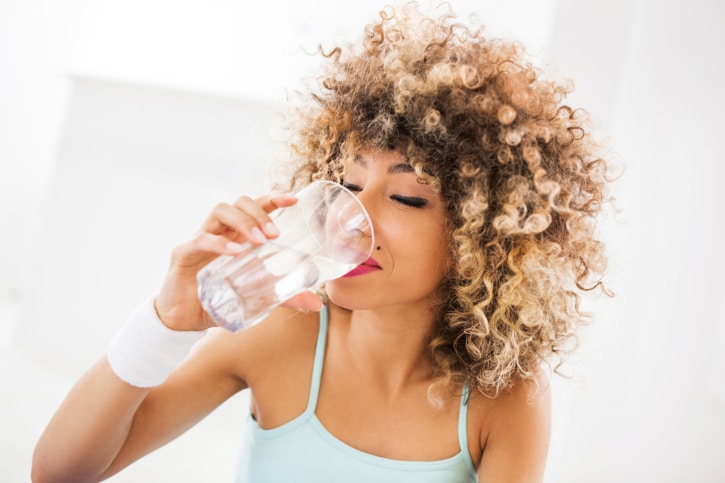 (BlackDoctor.org) — The vast majority of our body’s composition is water. Just think about it – our blood is about 83% water, our muscles are 75% water, and even our bones are almost 25% water. Water is the essential ingredient of an enormous amount of our body’s essential functions, and without it human life is simply not possible. Over all, the human body is approximately 2/3 water.
(BlackDoctor.org) — The vast majority of our body’s composition is water. Just think about it – our blood is about 83% water, our muscles are 75% water, and even our bones are almost 25% water. Water is the essential ingredient of an enormous amount of our body’s essential functions, and without it human life is simply not possible. Over all, the human body is approximately 2/3 water.
The Physiological Functions of Water
Water performs many functions within the human body and is the medium in which many important biochemical processes take place. Our cells are themselves small watery universes, and you may be surprised to learn just how essential H20 is to your survival and well being.
Water’s importance is underscored by the following list of its universal importance:
• Water is the main ingredient of saliva, blood, stool, and urine
• Water cushions the brain and joints to prevent them from damage and shock
• Water lubricates joints, the brain and digestive tract
• Water is the medium for the transportation of nutrients and waste
• Water is essential to the maintenance and regulation of body temperature (through perspiration)
• Water is important to the proper digestion of food
• Water is a major part of lymph fluid and assists in the efficient function of the immune system
• Water prevents dehydration of the cells and organs
The Effects of Water Deficiency
The lack of sufficient water in the body can lead to many symptoms, some of which can be life-threatening if not reversed.
Symptoms may include:
• Constipation
• Decreased urinary output and dark, concentrated urine
• Kidney dysfunction and failure
• Kidney stones
• Abnormal blood clotting
• Bladder dysfunction
• Poor temperature regulation
• Confusion and loss of consciousness
How Do We Lose Water From our Bodies?
Water loss occurs in ways of which we may or may not be conscious, and the average adult human can lose up to 2 or 3 quarts of water from the body every day, all of which must be replaced. Sneezing, breathing, urinating, perspiring and defecating all contribute to fluid loss.
Your urine is an excellent way to monitor your level of hydration. If your urine is clear or light yellow and the amount of urine you produce is relatively large, you are well hydrated. If your urine becomes scant in amount and takes on a darker, more concentrated color, you are becoming dehydrated and should rehydrate immediately. If your urine has become excessively dark (cola color), you could be in grave danger and should possibly be rehydrated under medical supervision. If you or someone you know is indeed dangerously dehydrated, it is generally better to seek medical attention and have the rehydration supervised by medical professionals.
What Are The Healthiest Ways to Hydrate?
Drinking water is the most obvious way to hydrate the body, and many fruits and vegetables also contain a great deal of water that contributes to your daily intake. Tea, coffee, alcohol and soda can “count” towards your fluid quota to some extent, but these drinks can also lead to increased urination (especially in the case of beer and coffee), thus these fluids can actually cause you to lose more fluids than they provide if your intake is excessive and you do not supplement your intake with water.
In terms of sports drinks, there are mixed opinions regarding their necessity, and many nutritionists maintain that plain old water is truly the best fluid for hydration, even for athletes.
When you are sick, rehydration can be even more important, especially during illnesses where thick mucus and respiratory secretions are apparent. Believe it or not, the best way to make those secretions thinner is to hydrate, and you can do so with herbal teas, water, fruits, vegetables, and soups and broths. And whereas 2 or 3 quarts per day is recommended for a healthy adult, a gallon or more of fluids is generally recommended during acute illness.
Hydrate, Hydrate, Hydrate!
In order to be better hydrated, try starting each day with a glass of water. If water is not your favorite beverage, try squeezing fresh lemon in your water, or buy carbonated water. Flavored water can be a good way to stay hydrated, but many brands of flavored water contain added sugar, something to take into account if you are diabetic, pre-diabetic, or simply trying to maintain or lose weight.
If you have a hard time remembering to hydrate, try to get into the habit of carrying a water bottle with you wherever you go. Many plastic bottles contain chemicals (like BPA) that can leach into your water, so don’t use plastic bottles more than once. BPA-free bottles lined with stainless steel are now popular and relatively affordable, so invest in a metal bottle that you can make a part of your daily life.








